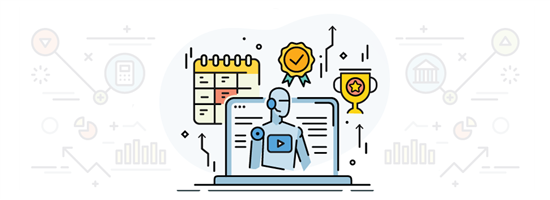Are Robo Advisors a Good Idea?
Robo advisors make it possible for new investors to start investing. But they come with a fee. Are they worth it? Read on to learn about the pros and cons.
 |
Over 1 out of 3 Americans are too afraid to invest. But there are beginner-friendly ways to grow your money.
Robo advisors have low fees and account minimums so it's possible for anyone to start investing - even if you know nothing about stocks. In recent years, these platforms have ballooned in popularity.
That said, using a robo advisor won't be right for everyone. In this guide, we'll break down the benefits and downsides of using a robo advisor.
What Do Robo Advisors Do
Robo advisors offer online automated investment services. They use a computer algorithm to select investments for you based on factors like:
- Your age
- When you'll need the money
- Your risk tolerance
They make all the investment decisions for you and automatically manage your portfolio. You can be completely hands-off.
Because robo advisors use automated management, they can provide the service at a low cost (compared to human financial advisors). Many have no (or very low) starting minimums, so you can start investing very fast.
5 Reasons Why Robo Advisors Are a Good Idea
 |
Robo advisors are great for:
- Beginners who don't feel confident investing on their own
- Beginners without a lot of money to invest
- Investors who want to be completely hands-off
Pro #1. Beginner-Friendly
A robo advisor is a great starting point into the world of investing for nervous beginners. You don't need any investing knowledge or experience. Just simply answer some questions and the platform will choose the best investments for you.
Plus, robo advisors such as Betterment and Acorns have no minimum requirements, so you can start investing even if you only have $5.
You don't have to wait until you learn more about investing or until you have more money. You can start right away and have your money work for you sooner.
All you have to do is fund your account. You can literally "set it and forget it" by setting up automatic monthly transfers.
Betterment: Compare Pricing
Pro #2. Low Entry Fee
Traditionally, if you want someone else to invest for you, you'd have to hire a human financial advisor. This is usually expensive. In comparison, robo advisors offer the service at low fees.
Usually, the fee is a small percentage of your balance - typically 0.25% - 0.50% of your assets under management (AUM). For example, Betterment's annual fee is 0.25% for balances of $20,000 or more, so if you invest $20,000, that costs just $50 per year.[1] This is a very affordable way for small investors to get started.
Some robo advisors have a flat fee structure. Acorns charges a monthly fee starting at just $3 per month.[2] This pricing model is even cheaper for larger balances.
$20 Investment Bonus
- Open an Acorns account (new users only)
- Set up the Recurring Investments feature
- Have your first investment be made successfully via the Recurring Investments feature
If you have a larger amount saved up, Schwab's robo advisory service has no advisory fee at all. But the minimum investment is $5,000.[3]
Pro #3. Build Diversified Portfolios
One of the main keys to smart investing is diversification. This way, if one investment doesn't do well, you have others to carry you through and you don't lose all your money.
Robo advisors automatically build a diversified investment portfolio across many companies, industries, and markets. Their portfolios are constructed based on the Nobel-prize-winning Modern Portfolio Theory, which minimizes risk while maximizing returns.[4]
For example, Wealthfront invests your funds in 11 asset classes, including U.S. stocks, foreign markets, and even real estate and natural resources.[5]
Most robo advisors invest in low-cost ETFs, which are baskets of a collection of stocks and bonds - up to hundreds in one. This ensures that you're well diversified while keeping fees low.
Pro #4. Handle Difficult Tasks
Robo advisors automate complicated tasks, like portfolio rebalancing and tax strategizing. This can help you stay on track and achieve better returns than if you were to do it yourself.
Portfolio rebalancing is necessary to keep your portfolio at the correct risk level for your goals. If you were to do this yourself, you'd have to calculate how much to buy or sell for each investment to bring it back in line. This is a very time-consuming task. Robo advisors will automatically rebalance your portfolio, so this is something you won't have to worry about.
In addition, robo advisors offer different tax optimization strategies. Many provide automatic tax loss harvesting, which is a strategy that uses investment losses to offset capital gains, thereby reducing the taxes you pay.
Pro #5. Takes Emotions Out of Investing
If we're managing our own investment portfolio, it's easy to let our emotions get the best of us.
In case of a market drop, we may panic and sell when stock prices are low. If a company stock is skyrocketing, we may be eager to get in on it and buy when the price is high. Or we may get frustrated that a stock isn't growing and get rid of it, only for it to grow later.
It's perfectly normal for stock prices to go up and down. Historically, over the long term, stocks always trend upwards. We'll have better success when we hold on to our investments for long periods of time.
Since robo advisors do all the portfolio management for you, it takes the emotion out of investing and you won't be tempted to make rash decisions. This gives you a higher chance of long-term returns.
3 Reasons Not to Use Robo Advisors
 |
Robo advisors may not be ideal for:
- Experienced investors who enjoy researching and investing on their own
- Those who don't want to lose profits to service fees
- Investors actively trying to beat the market
Con #1. Service Fees Can Get Expensive
Even though robo advisor fees are small to start, the fees will add up to a lot over time. Especially as your balance begins to grow.
Let's see how that looks using a 0.25% AUM fee (which is the standard for a lot of robo advisors).
You start investing in your 20s with an initial deposit of $1,000. Every year, you contribute $5,000 into your robo advisor account. Let's assume an 8% annual return.
In this example, we're purely looking at the robo advisor service fee.
| Year | Portfolio Value | Robo Advisor Fees Paid |
|---|---|---|
| Year 1 | $1,000 | $2.50 |
| Year 5 | $32,233 | $237 |
| Year 10 | $78,826 | $971 |
| Year 20 | $252,016 | $5,040 |
| Year 30 | $637,425 | $16,011 |
| Year 40 | $1,495,091 | $42,339 |
In the first few years, it may seem worth it to pay a couple hundred bucks to have someone else invest for you. But by 40 years, you would have spent over $40K in service fees.
Robo advisors mostly invest in ETFs for quick and easy diversification. You could just invest in ETFs yourself with a DIY brokerage and save yourself the service fee.
This is mostly a personal decision. A lot of people are willing to pay for convenience.
Con #2. Not a Replacement for Financial Planners
A robo advisor is not the same as a financial advisor. Robo advisor services only handle investment management, but not financial planning.
Human financial advisors will meet with you to understand your financial situation and goals. Then, they'll come up with a personalized investment plan. As your life changes, they can help to adjust the plan based on new goals and life events.
But robo advisors won't know if you just got married or divorced or had a child. They only make choices based on computer algorithms. There's usually no human interaction to help with money concerns.
A lot of robo advisors offer built-in personal finance tools. You can link other accounts to see things like your total net worth and retirement projections. The software may offer some financial advice or guidance. But it's not a complete replacement for being able to talk to a human.
Con #3. Better Chance of Beating the Market Yourself
For the most part, robo advisors try to match the performance of popular market indexes. Their goal is to build long term wealth for you - not to beat the market.
It's very hard for investors to outperform the market. That requires a lot of research and staying on top of your portfolio.
But if you're someone who enjoys researching (and has the time), you may want to manage your own portfolio. With wise stock picks, you could earn higher returns.
DIY investing also gives you the chance to try out advanced investment strategies (like options and margin trading) for potentially more profit. Robo advisors provide limited investment options, so experienced investors may find that it won't meet all their investment needs.
Alternatives to Using a Robo Advisor
 |
Like previously mentioned, robo advisors invest in ETFs (exchange traded funds) to create your diversified portfolio. You can also just invest in ETFs yourself with a regular DIY brokerage account. There's no need to go through a robo advisor if you want to save on fees.
Funds are professionally managed by investment advisors. So you still get the benefit of having an actively managed investment product.
For beginners, we recommend looking into these:
- Index funds: These follow a specific market index. For example, you can buy into an S&P 500 Index fund, which invests in the 500 largest U.S. companies.
- Target date funds: These funds are designed for a specific retirement date. For example, if you're 25 now, you can invest in a Vanguard 2060 target date fund. The investment strategy will be more aggressive to start and become more conservative as you get closer to retirement.
You can just pick a handful of funds to invest in, which will give you a diversified investment plan.
There are lots of micro-investing apps that allow you to invest in ETFs with small amounts of money.
Are Robo Advisors Safe?
It is safe to use a robo advisor, as long as it's a registered broker/dealer with FINRA and member of the Securities Investor Protection Corporation (SIPC). Your investment accounts are protected up to $500,000 per account in the event that the platform goes out of business.
But note that the SIPC does not protect you against investment losses.
Most are also registered with the Securities and Exchange Commission (SEC) and act as a fiduciary. This means that the robo advisor is legally bound to act in your best interests.
Your information is also protected with 256-bit encryption. You can trust that your data and money are safe.
What the Experts Say
CreditDonkey asked a panel of industry experts to answer readers' most pressing questions. Here's what they said:
Bottom Line
There's no denying that robo advisors have changed the investing landscape. They have made it possible for everyone to invest.
Overall, robo advisors are a great, low-cost option for those who aren't sure how to start. Instead of waiting around feeling stuck, you can use a robo advisor to start investing sooner. They're also good for busy folks who don't have the time to research and handle their own investment portfolios.
If a robo advisor can get you to invest more regularly, then it's worthwhile. As your balance grows and you gain more experience, you can decide if the fee is worth it or not.
But remember that robo advisors do not take care of your entire financial planning. If you have money concerns, they're not a replacement for meeting with a real human being for financial advice.
References
- ^ Betterment Pricing, Retrieved 12/03/2023
- ^ Acorns Pricing, Retrieved 11/27/2020
- ^ Schwab Intelligent Portfolios, Retrieved 11/27/2020
- ^ The Nobel Prize: Prize in Economic Sciences 1990 Press Release
- ^ Wealthfront Investment Methodology White Paper, Retrieved 11/27/2020
Donna Tang is a content associate at CreditDonkey, a personal finance comparison and reviews website. Write to Donna Tang at donna.tang@creditdonkey.com. Follow us on Twitter and Facebook for our latest posts.
Note: This website is made possible through financial relationships with some of the products and services mentioned on this site. We may receive compensation if you shop through links in our content. You do not have to use our links, but you help support CreditDonkey if you do.
Empower Personal Wealth, LLC (“EPW”) compensates CREDITDONKEY INC for new leads. CREDITDONKEY INC is not an investment client of Personal Capital Advisors Corporation or Empower Advisory Group, LLC.
Read Next:


